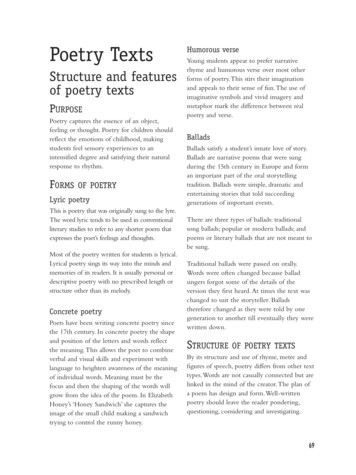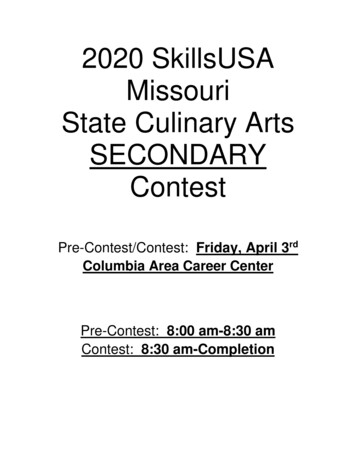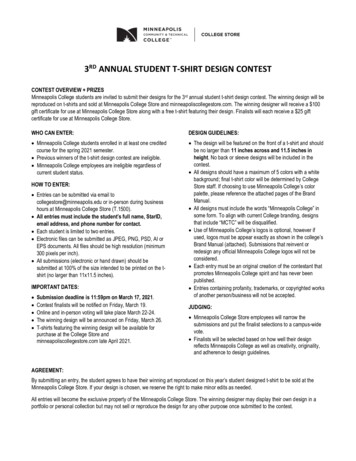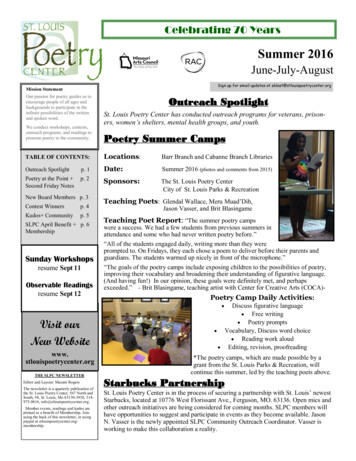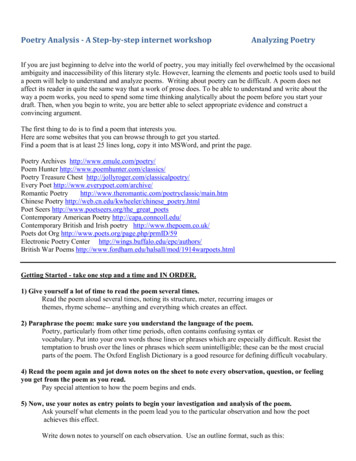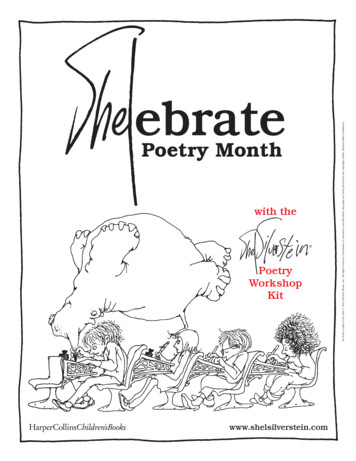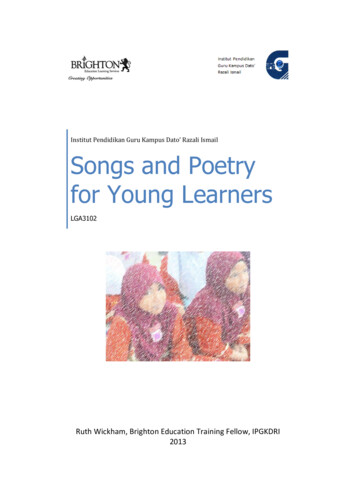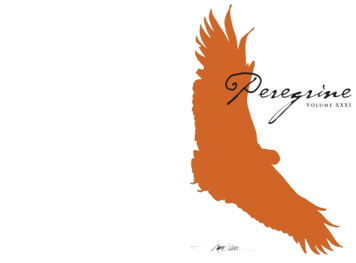
Transcription
Annual Pat Schneider Poetry Contest Winners2016First PlaceJames K. ZimmermanHonorable MentionEanlai CroninRuth Q. LeibowitzTheresa VincentVolume XXXIThis issue also includes work by:Wendy Brown-BáezD.G. GeisCarolyn RalstonAnne BakemanLee GeiselmannSharon RuffAnna BernsteinBB HohenbergPat SchneiderMary O’Keefe BradyRich H. Kenney, Jr.Peter SchneiderBarbara BrooksPooja Kothari, Esq.Courtney SundayNancy ChristophersonBarbara JohnstoneJeanette ToparRobert ColesSean LauseJeanette TryonEanlai CroninRuth Q. LeibowitzTheresa VincentJaclyn DesforgesJeri Okamoto-TanakaSusan WallachBonnie DurranceLisa PeckSusan WhelehanChristine EasterlyAnnette PeizerPatricia WilliamsCarol EdelsteinM. B. PowellAnne WingfieldElaine FrankonisPeregrine
Peregrine2017Managing EditorPoetry EditorProse EditorEmerging Voices EditorLayoutPublisherVolume XXXIKate Eliza FrankRachelle M. ParkerMilo MuiseKaren BuchinskyLane GoddardPat Schneider
Copyright 2017 Amherst Writers & Artists Press, Inc.ALL RIGHTS RESERVEDISBN 10: 1976483182ISBN 13: 978-1976483189ISSN: 0890-622xAmherst Writers & Artists Press, Inc.P.O. Box 1076Amherst, MA 01004Phone: 413 253 .orgPeregrine is published annually. Submission details are available atamherstwriters.org or peregrinejournal.submittable.com. Payment is incopies. The editors endorse the practice of simultaneous submissions.Copies are available on Amazon.com for 12.Amherst Writers & Artists (AWA) affiliates offer writing workshops foradults, youth and children across the world. In addition, AWA sponsorspublic readings and maintains an international training program thatsupports the work of writers and artists. Amherst Writers & Artists Press,Inc., publishes Peregrine, books of poetry and fiction, and the AmherstWriters & Artists poetry chapbook series.Cover art by Barry Moser (used with permission)Peregrine nesting sketch by Karen Buchinsky (used with permission)
Contents2016 Pat Schneider Poetry Contest WinnersFirst PlaceHonorable MentionJames K. ZimmermanEanlai CroninRuth Q. LeibowitzTheresa VincentContributorsBarbara Johnstone1Ruth Q. LeibowitzThe ThawMy Father’s EnemiesJaclyn DesforgesAfter HoursBarbara BrooksQuiet TimesPeter SchneiderIn The Key Of CCarol EdelsteinFront Desk, Day OneNancy ChristophersonNearing the Vastness of ThingsBonnie DurranceStorm at SeaMary O’Keefe BradyAt the PreserveEanlai CroninMise EireCarolyn RalstonFemale, 73, Femur FractureSusan WallachThe Scent of SevilleSean LauseBurn and RaveAnne BakemanRockawayPat SchneiderAdult Children,Anna BernsteinI Visit You in a Mental Hospitaland Can’t Get the Door OpenRobert ColesThe Down CurveCourtney SundaySaint PeterBB HohenbergMemory ToolsJames K. ZimmermanWild MushroomsAnne WingfieldTomorrow CloudyPooja KothariThe IslandPatricia WilliamsPerils and ChoicesSharon RuffThe Impound LotJeanette ToparReturning in SpringJeri Okamoto 7282930 iii
M.B. PowellD.G. GeisTheresa VincentAnnette PeizerLisa PeckLee GeiselmannJeanette TryonRich H. Kenney, Jr.Wendy Brown-BáezElaine FrankonisChristine EasterlySusan WhelehanA November Meditationon the Long NaveMoral InventoryWhat There AreNo Words ForEmerging TortoiseShe Goes to PrayDark Road Between LightsIndustryThe Pullman Porter Circa 1923Traveling HomeThe Fabled Coat Tale:a double haibunThe GrillWilliam Carlos Williamswas Never in my FridgeContributorsiv 31323334353637394041424344
Barbara JohnstoneThe ThawShe’s come to the ocean for this.She’s like the dead gulleaten out by crows.When she wakes with more strength,she’ll swim past the breakersand sink. Now, she sleepson the beach in a triangle of logs.A stray dog drags the gnawed bonesof his body into her bed of sandand lays his mangy skin and bits of furagainst her until the thin blanketbegins to thaw the permafrost she’s buried in.She wakes to warmth she can’tmake sense of, looks for its source,and sees her own empty eyesand ravaged body. She moves awayfrom her reflection; he mirrors her walk.She shoos him away and he leansagainst her leg, crossing the boundaryinto the arctic countrywhere she alone lives.Unable to get away from the dog,she thinks tomorrow, then,and goes to her cabin and sleeps.In the morning, he lies by the garbage binnext to the front door,as wrong as she is—and barely alive—then crowds her legas she walks the shore’s edgetoward the steep drop-off where she’ll die.The dog’s scant body warmth seeps into her,and she walks on and on as one tearand then another thaws. 1
Ruth Q. LeibowitzHonorable Mention 2016My Father’s EnemiesAfter sunsetmy father’s enemies lurked in our backyard,spying among branches of old oak.At dinnertimemy father made us draw the blinds.Did he think a sniper awaitedthe moment one of us wouldlift a forkful of roast chickenor baked potato?Would our destruction be immediate,or would the enemy watchstill and silent through the main courseuntil we thought we were safe—then shatter our windows with bulletsjust before we got a taste of something sweet?They weren’t your averageNew York mobsters or the needy poorwho lurked outside,looking in on our light from their darkness.Ancient revenants hounded from the old country,they had stowed away on passenger ships,followed us to Americato rise from their coffins again.No matter what we builtthey would raze it,no matter what we birthedthey would strangle it,no matter how warm and vibrant our bloodthey would drain it.2
When I was tenI wrote a storyabout a block of pretty houseswith manicured lawns.Even while the sun shone on the rest of the neighborhoodon one house it was always raining.When I was forty-fiveSmall infarctions and tangled dendrites invaded my father’s brain.His enemies gained the strengthto enter his house in broad daylight.We were listening to a tapeof liturgical music from Hungary.“Save yourself,” he shouted, his eyesflooded by father-love and fear,“They are here!They have come to destroy the synagogue!”—while afternoon light flooded the living room,and in the spring afternoona million buds swelled, pushingupward towards the generous sun. 3
Jaclyn DesforgesAfter HoursThe ceremonial action offlapping one’s arms arrhythmicallyis not to be done sober.It’s a nightly ritual, yes, aninescapable task she must completebetween the hours the moon risesand the moment she falls asleep.She climbs downward into a black pitof chemical comforts andsweet, buzzing confusion,locking arms with strangersand feeling her pulse’s beat.Her heart falls into step with the crowd around her,the sound of feet stomping muffledby the air, the sky, the smokethe soot and rain.Who is she now,lost in the crashing waves of music,of fractured inhalations,stilted movement and unknowable sorrow?Here, tonight, nothing matters butthe blood in her veinsthe crushing weight of the crowdlost and together,alone and apart.4
Barbara BrooksQuiet TimesIn the quiet of the morning, I can hearthe dew falling from the leaves; the wind flowsthrough the blue jay’s wings. Not even a breeze talksin the woods; a skink rustles through dry grass.The forest so still I can hear rain walkingthrough the trees. When snow caresses the ground,the earth is silent.The quiet between ocean waves:time for one lone thought. 5
Peter SchneiderIn The Key Of CI awakein this place!The original placea dreamtranslucentas a thin sliceof pale cheese,Wisconsin fogof memory.My dream and waking daysa common thread,wanting to get back therewhere doors are always open,I bank toward music.Locks on my fingers open,waken old memory.I return as from alost land.Young again,banking now,coming inin the key of C.6
C arol EdelsteinFront Desk, Day OneHe’s uncertain the job is even his because he never signedanything, he was hired over the phone, and the lady who called totell him to show up was not the man who hired him. And he hadn’twritten down their names, so whoever would be there when heshowed up might not be either of them and might not know he washired and might expect someone more qualified and taller and witha blazer instead of a hand-me-down suit jacket. Plus his own namePhilip was not a name he liked. He went by Pip, and a nickname isbestowed by others, not announced by the subject himself, correct?He was not used to being correct in speech and dress so if he was tomake the clientele comfortable as they checked in, he would be wiseto refer to the checklist. The checklist was in small print, close lines.He was tired, as he had fallen asleep in the wee small hours, thenwoken with a start at first light. Thirsty too.Just do your best, said his mother.Just say yes to everything and try to look alert, said his father.Do they give you big tips? said his sister.So far the answer was no. Not that the people weren’t friendly.Friendly but self-reliant and not generous. They carried their ownbags to the elevator. Wouldn’t let him get those bags into his hands.Behind the desk he fidgeted, moved from foot to foot.You seem nervous, said his boss, a fellow one year younger thanhimself but not weak or wavering like the scrawny guy on the beachtowel in the comic books who gets sand kicked in his face. But there’sreally no mystery to this job, said his boss. Just don’t walk away fromthe lockbox if the lockbox is unlocked. And no fraternizing with theclientele when you go off shift.He would look fraternizing up in the dictionary later thatevening and feel some small satisfaction that it meant what hethought it meant. He moved the vase of yellow roses on the counterand in doing so nearly tipped the whole thing over. Nearly but not.How was it, said his mother.Fine, he said, I think.Work is work, said his father. Don’t expect to like it.Did you get any tips? said his sister. 7
MYOB, he said. He spoke to her mainly in initials and acronyms.Oh STFU, she said.He gave her the finger. He pushed her. She pushed back. Thatwas always as far as they went.Will you two stop it, said their mother, but it was surplus torequirements. He was already tucking in to an extra large bowlof Sugar Pops. She was already heading to her room to call herboyfriend and blather on for hours about nothing.It’s your first job! said his mother.Don’t blow it, said his father.He chewed and swallowed, shoveling in the sweet puffed cornquickly before the milk could soften it.Nancy ChristophersonNearing the Vastness of ThingsThe mind grasps for anything at this moment tohold onto lest it drift out and fly off into air like asmall brown bat. Cleaving the starlight, eatingbugs, sweeping the blackness.8
Bonnie DurranceStorm at SeaMoments fall over the edge likeleaves over glittering falls.Choices. Here: Take this basket.Go out to the garden. Fill it with fruit.Or go to the street.Stuff it with flyers from beggars.What you put in the basket you will carryuntil you learn to let go.In my dream eyes, the watertastes heavy and mineral bright.The other night, I was walkingwith someone beside me and feeling at peace.We were going to be painting the hillside.My straw hat blew off in the wind.I asked what to hope for.Birds exploded from trees.I think they were laughing. 9
Mary O’Keefe BradyAt the PreserveTake my hand, pull me closer,Put your arm around my shoulderAs we weave on gravel pathsIn the dapple of the day.Match your step to mine,Let me feel your chest expand,As if we take one breath,Expel a single exhalation.We circle wide as geese corral their goslings,Watch them waddle single file,As our young toddledOne behind the other.You disentangle to search for a flat stoneAnd in that warm space you occupiedA chill sweeps through me, hauntingThe day we’ll lose each other.You skip the stone across the pond,Skim our speed-bump memories.Circles ripple, larger, wider,Pulling us in, letting us go.10
Eanlai CroninHonorable Mention 2016Mise EireSitting at the dinner table coloring,the evening news, of all things, pulls me from my reveriebecause I cannot ignore another minutethe music pouring from the television,sweeping the whole lot of us into its compositionmarker poised mid stroke as I listenimages on screen of sheer cliff walls and screaming gannetstill a jam packed orchestra now fills our kitchenlike some great session imported from a closing pubbut better, boasting in rising trills and fading diminuendosthe bogs and bohereens of a beloved creatureseas cresting landward in waves of perfectionfrosted tips like magic horses bearing mythic figureshome from Tir na nOg, my mind now soaringlike a low flying curlew, blades of meadow grassand early bluebell tickling my feathered bellytill I am softened into the minims and quaversof someone else’s love of Ireland, mining the marrowof the music’s birthplace, drum beat and timpanipeaking in my bloodstream, and now I’m whisperingto the kitchen Mise Eire, I am Ireland, and the soundof my own voice emerging from the distancereturns me to the page and the red markerlong gone from the book’s border onto formicaand even after the composer’s face and date of deathflash before me in sudden silence, Sean O Riada,the man who put the Irish Mass to music,I can’t stop hearing the flutes and fiddlescarving out my insides till I am nothing 11
but turf and stone and beehive hut,weighted by the rains of a thousand burststraced by the hands of such fervent prayersthat only the dolmens and downs hold fastas if each place my mind now rests, bore themist of every known Gael’s pulse and breathtill the symphony of the very land herselfgifts us the lost thing now intact, the thing undamaged,unscathed, untouched, that we carry now, our sacred trust,as we scamper barefoot through the drizzled dusk.12
C arolyn RalstonFemale, 73, Femur Fractureflorescent lightsfaces of strangersin scrubs—bright pinkfingernail handsjab my veinstattooed young manwheels my near-nakedbody to x-ray and back(he couldget me out of here)clipboard womanpokes me with questions—what medicationswhat surgerieswho lives with youwere you walkingunassistedbefore the fallDo you want to be resuscitated?my beleaguered mind digs for purchaseon this liminal threshold,now added to the day’s listof horrors and inconveniences,a sliver of anger piercesthe curtain Dilaudid has drawnover my consciousness.Hell, take my pants and shirt and shoes,my cell phone, watch, ring,cut my flesh, drill my bone,My life, though, really? today at 73?because I fell walking my spaniel?Do I want to be resuscitated?Yes, yes, for God’s sake,I want to—be. 13
Susan Wall achThe Scent of SevilleAddie slipped on her spring jacket to shovel the ten inches thathad fallen during the night. No matter how dry the snow, her wintercoat was too heavy after fifteen minutes of intense work. She gazedout the window, avoiding the empty spaces that surrounded her shoesand boots, the lone hooks without his jackets, and the neglectedcorkboard where they had once left notes for each other. As shestuffed tissues in her pocket—for her nose usually started dripping inanticipation of the cold—she felt the velvet gloves, an impractical giftfrom her daughter, and something else. Something soft, silky.She pulled it from her pocket and slowly sat on the bench in hermudroom. An orange blossom petal. She crushed it and held it up toher nose. No, not even the faintest hint of scent. But the periwinkleblue gloves still smelled like her nights and days in Seville. A week ofsilent laughing at the squashed oranges everywhere and the constantstopping to pick up the fallen flowers from the sidewalks, breathingthem in before stuffing them into pockets, just so she could keepherself surrounded by the smell of light and escape.For that’s what that trip was. Escape from the Maine Februarywinter, away from the promise of continued cold and ice, away fromthe old Addie, who couldn’t understand how to begin a new life inknown surroundings.So to Seville, a city of orange blossoms, tango, olives, red wine,and color. Too much color for her eyes that were used to only white,gray, and black.She could have wandered in her hotel the entire week—a labyrinthof passages and stairs and mirrors and fountains, living in turquoise,lilac, and gold. But then she’d have missed the oranges underfoot, onpark benches, on statues, on windowsills.And those white flowers. She could never breathe them in enough.Her shoulders lowered, easing in memory of the sun’s warmth.14
Sean LauseBurn and RaveMy father rages at time and fate,wrestling with the angel of bandages,burning the forge of his dying heart,cursing the god of bedpans,and the nurses that flutter like frightened doves.My father waves his arms like brokenwarning gates, his red eyes daringdeath’s dread engine. He kicks the valetsof coughs and sneezes,and laughs at their tinhorn conclusions.He refuses help, riveted to his pain,spits out pills and magic elixirs,blocks the descending needles, knocksthem to the floor, denies every comfort,nailed alone to his suffering.He lowers his whole life into his handsand molds them into fists of rage,he who refused to take the dolewhen the factory shut down for the strike,who built our house to endure all storms.He who shined shoes rather than begin the streets of Chicago, 1936,sold papers to support his invalidmother, his sister and two younger brothers.All those who wish to help him—he’ll have none.I wait next to him, while late, dire late,he thrashes against his restraints.Silently I cry and cheer him onas he raves against the metal carriagethat pulls him so gently into night. 15
Anne BakemanRockawayIn July my mother forgets how to swim.She stands waist-deep and frailin the lake’s roped-off swimming areawhich last summer she crossedand re-crossed in tireless even strokesand tells me with a strained laughthat she can’t seem to do it, as if she werestill the child she was at Rockawayin the summer of ’25, before she learnedhow to move through water by parting itwith her arms, flutter-kicking her legs,from the girl whose family hada water-house on stilts. She says her feetdon’t want to leave the ground.I only have to get her started, becauseno one unlearns how to swim,but when I stop holding her, sandwich-like,one hand on top and one beneath,her chin goes under, and under again.“Enough!” she sputters, flailingupright. Hisses “Go!” and I’m gone,thinking how can this be happening,she was a good swimmer,thinking maybe it won’t come back to her,thinking swim while you can, girl,thinking I wish I could have been thereto see them in their old-fashionedbathing costumes, caps like rubber helmets,paddling the swells, shrieks drownedin roaring surf. How they could swimat all, saltwater incessantly rushing in,swirling, crashing, pounding against them,pounding the stilt-like pilings holding upoptimistically perched houses,then rushing out again.16
Pat S c h n e i d e rAdult Children,how they visitfrom the far-off island nationsof their livesHow they bring us shiny notionsfrom the future we can’t possibly surmiseHow the foreign languages they speaksurprise, delight and frighten usuntil we remember how we pushed themin the swing, how they shouted, laughing,higher! Higher! 17
Anna BernsteinI Visit You in a Mental Hospital and Can’t Get the DoorOpenIt’s hanging-proof. The knobis tapered inward and ribbed,like a steel cupcake liner.You shout instructions untilyou come and do it yourself.I’ve brought books takenfrom my school library. Theyare taken and not borrowedbecause I have no planto bring them back. East of Edenfor some reason. I’ve neverread it. The cover reminds me ofThe Secret Garden, whichreminds me of a boy withwrong legs cooped up in a bed.You’re sitting on the edgeof a bunk. Your smile isso many things: a little scrapof lemon rind found on the floor,an apology for a favor, atight wave from a friend who does notwant to run into you. “I brought books,”I say. You point out a stack of books.I put them on top and feeljust a little farther from you,as if we are in moored rowboats,and you have justpushed offand away18
Robert ColesThe Down CurveRimbaud’s whole career ended on a down-curve.—Robert CohnI’ve been thinking about funerals,what strange words are said—insights, truths, recollections.Is this where we all end upwatching our future lives descend,victims of folding dreams?I have never felt so hopeful as now,my years of turmoil—over.I no longer want to run away;I want to stay and fight.Even though I bend and break,I will not break or burn.Even though my eyelids sag,I will look in the mirrorand push them up. 19
Courtne y SundaySaint PeterWhen a doctor looks at you and says the word “malignant” youhear nothing afterwards. You enter a vacuum of silence soon floodedby chatter. Despair holds hands with hope. Blame makes love tocompassion. Suddenly, you are ushered out, realizing that you don’tknow the whole story, even though it is your story.You reach out to friends for sweetness but are instead greeted withadvice. Your friend with one year of naturopathic medicine under herbelt plies you with vegetables, overflowing your fridge with hopefulhealth, as if to shock your cells into submission. You eat so much kaleyou no longer taste its bitterness.Another well-intentioned friend believes that your lack ofexercise is the culprit. “Sitting is the new smoking,” he preaches andoffers to wake you up at 5:30 a.m. for a jog. Although he promisesit is invigorating, his opinion clashes with a scientifically mindedfamily member who insists that rest is the most important thing youcan do. Your sneakers grow lazy in the corner while your duvet ispermanently creased, but still you wake up weary and uncertain.What had the doctor said? And why can you hear every voice buthis?People are not only proactive in the obvious realm. “I’ll pray foryou,” a well-meaning aunt will ensure, a woman who holds no spacein your childhood memories but hazily appears alongside what sheviews as tragedy. You know that she still phones on a rotary telephone,keeping extra rosaries around in case one gets lost, but not livingan adventurous enough life to lose anything. She tells you of SaintPeter, whose healing powers radiated into his shadow. You politelyaccept her prayers but secretly scoff. The next time you see a shadow,however, it will take everything in you not to chase after it to bathe inits darkness. You remember Peter Pan stuck his on with soap, so youlater up more at night, just in case every story happens to be true.When you towel off, you may notice a missed called from anunknown number that you have taken the time to memorize.Because it is the hospital, or as you like to see it, part fairy godmotherand part grim reaper. You intend to call. It is the right thing to do. Yet20
you haven’t accomplished the list of healthy habits just yet. One moreswig of olive oil, some dental floss, and you will be good to go.Maybe.BB HohenbergMemory ToolsMy tools lie ready here. My green screwdriver comes in handy, sincescrews are always coming loose. That little hammer is just the rightsize — my hands are not so large, you know.Especially now that I have shrunk in height, it seems my hands haveshrunk as well. The other tool I rarely use. My hands are not strongenough to grip it with enough force to turn anything.Besides, I seem to have forgotten what it’s called. Memory slips away,you know? No matter how many sardines you eat each day!I’ve managed to put away at least a half a dozen a daythese past two months, ever since readingthat they’re supposed to be goodfor the brain. They taste right fine on toast,sprinkled with a little lemon juice.I had some for lunch today. Now I’d better takea little nap. When I awake I’ll tackle those loose screws. 21
James K. ZimmermanFirst Place 2016Wild MushroomsTina lived over on the farside where cows paid tributeto grass and granitein cud and dungand morels like elvessprung from the secretwomb of the fieldsin spring she hungclean clothes on the lineflags of her own private worldand daily ironed her bedsheetsbecause she loved to watchthe wrinkles disappearin her room, the ceiling worepentagrams in candlesmokealigned to the pole starso she could lie alonenear the window, watchingthe sky cluster like penniesin her pocket or sparrowsat the feeder in the morningin summer, pooled in unrulyclumps, meadow mushroomsreflected white cloudsamong the scattered goatsinky caps huddled on stumpsof fallen oaks and maplesshirts and socks pinnedtoo lightly flew off the linelike butterfliesTina chasing after themwith a basket full of lettucetomatoes, cilantro, corn22
and the pentagrams beganto turn over in their sleep, legsreaching up for the moonand Cassiopeia in her throneTina alone with her pillowon the floorlater in fall giant puffballspearl-white grapefruitsquatted in the grassuntil their shiny facesshriveled and grumbledlike old green men nursingthe last whiff of a cheap cigarand the pentagrams rolledagain, heads pointing southto her feet, Tina holding onto the corners of the roomthe shards of her dreamsthe thudding of appleson the roofthen came the death angelsghost-white in their lacycollars, readying the housefor the closing of curtainsand the first of snowsand Tina, dressed in fallenleaves, disappeared behindthe glasses at her templesnear the door where cowsfell silent in their foggy breathand goats chewed pensivelythe clothesline and the sheets 23
Anne WingfieldTomorrow CloudyTime drags his dirty feet.The clock ticks and tocksanother day to its close.Tomorrow the sun willonce again open wideher face. With luck theclouds will cover her up.With weariness we waitto see and hope for rain.24
Pooja KothariThe IslandShe had had enough. Enough matchmaking websites managed byher father, enough hearing about guys who she knew would never bethe “right one,” enough of her own charades. After lying for ten years,a mindless question over the phone felt like a shove down her throat:“Beta, are you ever going to settle down?” Mom asked mindlesslywhile cleaning out the garage. Without warning, she vomited thetruth: “I’m attracted to men and women.” You know she only added“men” to make it palatable. Foolish.Smart as she was, she was too stupid to have done any preparationfor this unlikely yet inevitable moment. The one-week of silencefollowing her confession predicted the ensuing landslide. Themountain built over twenty-nine years crumbled into the oceanleaving her stuck on a jagged island, alone, on unsure footing, andarms outstretched. She reached out tentatively, flinching at theslightest wind that could send her tumbling off the rocks into thewater. Craving stability. Desperate for reassurance. The reassurancethat was always available to her no matter what she did wrong.They wanted to talk all of a sudden. She repeated her mistake, butnow with all three pillars: mom, dad, sister. Awkward, halting, andsearching, perhaps this was the definition of a “conference call.” Shetossed the acidic truth again through the phone’s receiver and heardtheir faces contort in pain and confusion, “What did we do wrong?”“This is my fault. I should have stayed home with you when you wereyounger.” “I don’t understand, is this a phase?” Sister was the onlyone who did not add to the fire. She did not try to extinguish it either.In those forty-five minutes, she heard her whole world crumble. Allthree of her pillars started to tremble. She ran around first trying tocatch the falling rocks then dodging them seeing how much it hurther body to brace their fall. “Beta, we are devastated, disappointedand depressed.”It was apparent that her honesty was unforgiveable. Her sistermelted and slithered away hiding her face. Her island was becomingsmaller and she faltered more often, unable to put her foot down on arock that would not move.“How could you do this to us?” 25
She slipped and fell into the water. It was shallow at the beginning.She got out and dried off. Trying now to make sure she would notlose her balance again. She begged them to be kind to her but she fellagain.“Do you want to explain yourself?”She fell again. Each time the water got deeper and she startedhaving to swim out, barely making it back onto the island, barelybeing able to dry off before she fell back in again.Then there was only silence. Land eroded from the island as sherealized her family was actively ignoring her. Suddenly, her emailswere not worthy of a response.“You don’t know how hard this is on us.”She laughed bitterly. “No one has it harder than me.” But she darednot utter another truth.How could this all happen? Like becoming homeless instantly,with no prelude. No guidance from her pillars. No foresight fromherself. She climbed higher onto jagged rocks. She looked downfacing the darkness below. “One more misstep and who knows if youwill land,” she warned herself. “Stop looking below,” she commanded,but her head would not turn to the sky. The rocks turned black,blending into the darkness around her. Dark grey clouds parkedabove her and the sun gave up obediently. In this darkness it did notmake sense to keep her eyes open. She felt around her for a placeto rest. Exhausted from straining her eyes and her body she laiddown. Nowhere to go, but at least she had a place to lay. Stuck in thedarkness. Alone. Cold. Blind. Hopeless. And Awake.26
Pat r i c i a W i l l i a m sPerils and ChoicesWe took our last ride of childhoodon a merry-go-roundin the park— emerged along tortuous roads,down a darkened, wet street,cobble-stoned —vanished into a worldof wrong turns and small talk— of butterflies who flutter for a day —wherethe ring of footfalls retreating in the dark,evaporatesin an empty moonlit squarewe might mistakefor distant snow. 27
Sharon RuffThe Impound LotHundreds of vehiclesheld in detentionat the impound lotEach tells an unhappy storywaiting for someoneto pay the fineParts of us live like thatstuck somewherein detentionWaitingfor someoneto bail us outViewing lifethrough the spacebetween the barsCould we returnto those stuck placesdo a search and rescue missionLet our grownup selfgrab
iii Contents 2016 Pat Schneider Poetry Contest Winners First Place James K. Zimmerman Honorable Mention Eanlai Cronin Ruth Q. Leibowitz Theresa Vincent Contributors Barbara Johnstone The Thaw 1 Ruth Q. Leibowitz My Father's Enemies 2 Jaclyn Desforges After Hours 4 Barbara Brooks Quiet Times 5 Peter Schneider In The Key Of C 6 Carol Edelstein Front Desk, Day One 7
